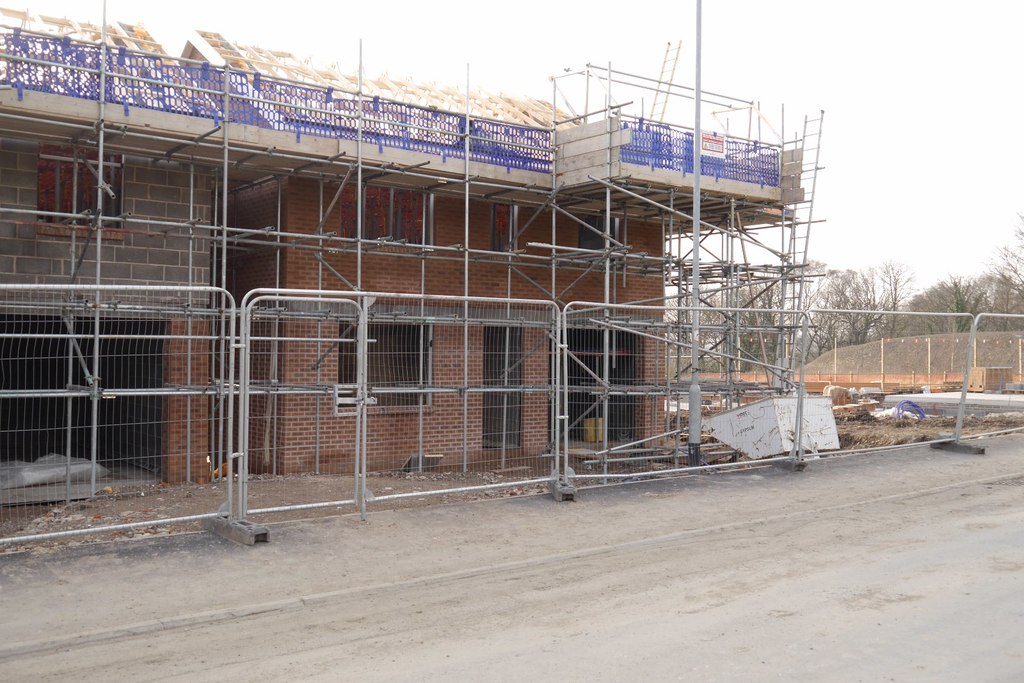The UK government is being urged to act swiftly to address the growing housing crisis in this country, as demand continues to heavily outweigh supply.
Bob Seely, MP for Isle of Wight, last week called for a planning system that is community and environmentally led that supports levelling up across the country at a Westminster Hall debate, highlighting that large developers land-bank large quantities of land that go undeveloped for decades.
The consequences of this, claimed Seely, were that new housing developments were often car-dependent “in the middle of nowhere” and against the wishes of the community, arguing that this is a key reason behind how over 1.1 million homes with planning permission are still waiting to be built, as reported by the Local Government Association. Further questions were raised by the shadow minister for housing and planning, who pointed out several potential loopholes that local authorities could take advantage of in order to build fewer homes than their communities need.
In response, the minister of state for housing and planning Lucy Frazer reaffirmed the UK government’s commitment to building 300,000 new homes a year, and that the upcoming reforms to the planning system will deliver a cultural shift in the way communities actively pursue developments.
In December 2022, the Department for Levelling up Housing and Communities released a consultation on its upcoming planning reforms. Propertymark will be posting its full response soon and encourages any comment on the proposals.
Timothy Douglas, head of policy and campaigns, said: “Propertymark has often stated that undersupply is and continues to be one of the key underlying issues facing the sector today. We therefore encourage the UK Government’s commitment to address the undersupply of housing. The historic levels of undersupply of homes, exacerbated by empty homes and unused brownfield land, all contribute to people having less choices of where they want to live. While there are several other factors impacting the number of homes that are built every year, we want to see reforms to the planning system that increase the supply homes across all tenures.”

How could dropping housebuilding targets affect the UK property market?
The chronic undersupply of homes in the UK’s property market has long been the subject of much political discourse, not to mention media attention. Indeed, the fact that the National Housing Federation (NHF) says that 340,000 new homes are needed to be built each year to stay in line with demand, it is clear to see why. We have been told that the Government is alert to the challenge. In its 2019 manifesto, the Conservative Party promised that by the mid-2020s, 300,000 homes would be built each year. However, that commitment has been relaxed by Rishi Sunak – in a bid to throw water on a backbench rebellion – from ‘mandatory’ to ‘advisory’.
But how could this decision affect the UK property market?
The imbalance between supply and demand
At face value, it could be argued that the housebuilding targets were not having much of an effect. Successive governments over recent decades have set ambitious goals relating to the building of new homes; year on year those targets were missed. According to official government statistics, 9,000 fewer homes than intended were built in 2016. The problem has got worse since; the data for 2021 indicates that the discrepancy between the targets and actual construction numbers had grown to 32,000. Supporting this, research from 2021 revealed that, in the ten years preceding, almost half of England’s local councils had not constructed enough houses to keep up with population growth.
The failure to build enough homes has exacerbated the supply shortage, in turn making the property market incredibly competitive for renters and buyers alike. Prices have risen sharply as a result. In fact, the average price of a home grew from £169,090 to £296,422 between October 2012 and October 2022, while average rents in the private rental sector (PRS) shot up by 11% in 2022 alone. Arguably, these statistics would suggest that house building targets have actually had little effect on home construction delivery.
Will relaxing the targets make matters worse?
That said, despite the fact that targets have never been consistently hit by government, there is little doubt that their existence has led to an uptick in construction levels. According to figures from the Centre for Policy Studies (CPS), for instance, 100,000 more homes were built in 2022 than in 2012, which the CPS suggests was the result of the presence of mandatory targets. By watering down targets, the Home Builders Federation (HBF) argues that fewer houses will be built annually. In fact, the CPS see completion levels falling by between 30% and 40%, while the HBF say that 100,000 less homes will be finished.
From this data, one would imagine that the disparity between supply and demand will continue to widen following the decision to drop these targets. As such, renters and buyers will likely face more competitivity and higher prices, compounding an affordability crisis that is already close to boiling point. Certainly, with a recession on the cards, the timing is less than ideal.
Other impediments to house building
Of course, increasing supply is necessary to fulfil the growing demand for homes and to facilitate wider access to the real estate market. But it is possible that there are more variables at work that are restricting construction levels to a comparable, if not larger, degree. The planning system, for example, has been branded as ‘the largest single obstacle to residential development’ by some real estate specialists, but has arguably been the subject of less discussion than national targets. As such, perhaps the removal of ‘red tape’ and building regulations would do more to alleviate the lack of supply. Indeed, such an argument has been touted by Rishi Sunak and his housing ministers of late. For the Conservatives, therefore, one answer to the house building and supply conundrum could be to remove the regulations that often hold developers back. Yet such a move would seem unlikely – if Sunak was under pressure from within his own party to curb housebuilding efforts, the decision to ease planning laws would surely come up against stern opposition.
What would Labour do to alleviate the housing crisis?
Speaking of opposition, it is worth considering what the Labour Party might do to alleviate the affordability and housing crisis, if given the opportunity. Indeed, the latest polling averages put Labour ahead by 21% of the vote, which would secure Sir Keir Starmer a majority of 42 seats, so perhaps Labour’s policies will have a greater impact on the property market in the years to come. At the party’s conference in Liverpool in September, the shadow minister for levelling up, housing and communities, Lisa Nandy, pledged that 400,000 social houses would be built under a Labour government to alleviate the deficit of homes in the country. By this argument, by improving the supply of social homes and re-committing to new housing targets, pressure would be alleviated on the PRS and wider market. However, as we are still a number of years away from a general election, it will be interesting to see whether such commitments are stuck to.
Approaching the issue from a different angle
For both parties, I would argue that there are other issues – like inflation and rising interest rates – that are doing more to exacerbate the affordability crisis than a lack of targets. Therefore, perhaps government needs to focus on fixing some of the macroeconomic pressures on the market before implementing house building targets on a national level. Indeed, such an approach would allow those of us in the property and specialist finance sectors to tackle the problem ourselves, so perhaps there is a different angle with which we can approach the housing crisis.
For instance, there are 600,000 vacant residential properties in the UK, and 216,000 homes that have sat empty for six months or longer in England alone. Meanwhile, as demand for commercial and semi-commercial properties have decreased following the shift to hybrid and remote working, an abundance of commercial and semi-commercial properties are no longer in use. Therefore, instead of building new homes, perhaps converting or renovating these vacant units and putting them back onto the market would do more to decrease competitivity in the market.
In doing so, the supply of homes would increase without the need for government initiatives, removing the burden on Westminster to encourage construction. That said, conversion or renovation projects of this nature can be complicated, so the planning system will need to be simplified to make it easier to carry out necessary refurbishments and conversions. Flexibility and certainty from lenders will also be required, and those of us who can provide such qualities will surely be contributing to the long-term sustainability and fairness of the market.

Three things government could do to support the housing market now
Help to Buy is no more. What should the government do now to support home buyers and builders?
Three things government could do to support the housing market now. With the housing market enduring a period of turmoil, along with the expiration of Help to Buy, there is now a conversation to be had on what the government might do to help stabilise or support the market.
When it comes to any potential new government schemes for the mortgage industry, Jeff Knight, director of Grey Matter Marketing Solutions, said he has three wishes. Knight wants "the broker community to be represented as part of any consultation process, for the government to consider where the greatest need is within the market, and to ensure that solving one problem does not create another. With regard to the second point, I would suggest that two key needs are around first-time buyers and energy efficiency,” he added.
Government support for first-time buyers For first-time buyers, Knight said the value that Help to Buy brought was obvious, however there is a need to look at the bigger picture now. “I actually believe that there needs to be some form of incentive scheme for house builders to create more affordable housing, and communities, for first-time buyers,” he said.
Knight added that developers will make more money from the bigger properties, but there is a real need for more affordable properties to be built. Therefore, he believes some sort of scheme to incentivise house builders to focus on more affordable home construction would be most beneficial, as well as a scheme that concentrates on encouraging and training more people to work in the construction industry, as labour supply needs to be increased.
“Building more affordable first-time buyer homes will not solve the whole problem, as there will be existing housing stock that remains over-priced, but it would deeply benefit the market, a solution to the lack of affordable housing in the UK is greatly needed, and he believes the Bank of Mum and Dad or Gran and Grandad are already doing enough. “A scheme to solve this would be perfect for greater equilibrium,” he said.
What government should do on energy efficiency Knight said energy efficiency is another area where a government scheme could help, and he believes it has really been brought to life in the current cold weather and sky-high fuel prices environment. The Ofgem energy-price cap rose to £4,279 in January, but households will be shielded by the government’s Energy Price Guarantee, meaning there should not be any substantial change for the time being.
Knight said, "in the past energy efficiency was a nice after-thought, but that the cost-of-living crisis has really brought the issue into the limelight. When you see some roofs with snow on, and their neighbours without the snow, you can see the difference in insulation quite quickly,” he said.
Knight believes that support therefore needs to be given to make homes more energy efficient, and swiftly. However, he said, "that this support needs to be made available to those on lower incomes, rather than the wider population. Whatever schemes do get considered, for me my first wish is crucial, I would really urge that any consultative committee includes some mortgage brokers. Whenever he speaks with mortgage brokers, they have a lot of good ideas which could benefit the market. Being at the sharp end of the industry, they have such invaluable insights; let us use it to solve real problems and not those that create other ones,” he said.

